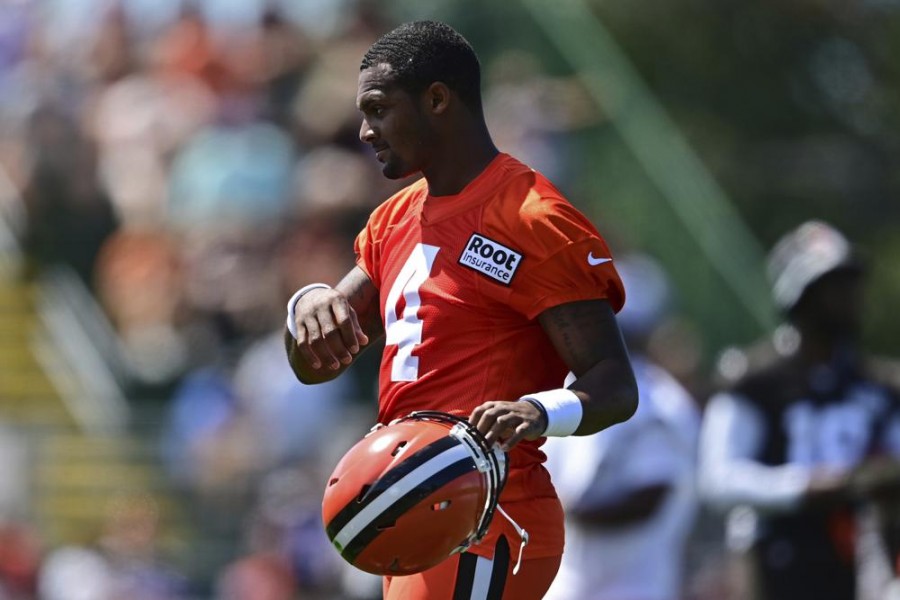Cleveland Browns quarterback Deshaun Watson was suspended for six games Monday for violating the NFL’s personal conduct policy following accusations of sexual misconduct made against him by two dozen women in Texas, two people familiar with the decision said.
The people spoke on condition of anonymity because the decision had not been publicly released. Watson, who played for four seasons with Houston before being traded to Cleveland in March, recently settled 23 of 24 lawsuits filed by women alleging sexual harassment and assault during massage therapy appointments in 2020 and 2021.
The NFL has three days to appeal the decision by disciplinary officer Sue L. Robinson. The NFL Players’ association already stated it would abide by her ruling. If either side appeals, NFL Commissioner Roger Goodell or someone he designates will make the decision, per terms of the collective bargaining agreement. The union then could try to challenge that ruling in federal court.
The league had pushed for an indefinite suspension of at least one year and at least a $5 million fine for the 26-year-old Watson during a three-day hearing before Robinson in June.
Watson can continue to practice and play in exhibition games before his suspension begins the first week of the regular season. He would be eligible to return on Oct. 23 when the Browns play at Baltimore.
After learning the ruling was imminent, the NFL Players Association issued a joint statement with Watson on Sunday night, saying they will not appeal Robinson’s ruling and urged the league to follow suit.
“Every player, owner, business partner and stakeholder deserves to know that our process is legitimate and will not be tarnished based on the whims of the League office” the union said in a statement.
As he awaited the ruling, Watson has been in training camp with the Browns. He has continued to take most of the reps with the first-team offense, which will be turned over to backup Jacoby Brissett while he’s sidelined.
While the NFL pushed for a severe penalty, the union had argued Watson shouldn’t be punished at all because he was not convicted of any crime.
Two grand juries in Texas declined to indict Watson on criminal complaints brought by 10 of the women.
This was the first case for Robinson, a former U.S. district judge who was jointly appointed by the NFL and the union to handle player misconduct — a role previously held by Goodell.
A three-time Pro Bowl pick with the Texans, Watson has seen his playing career stalled by the allegations that he acted inappropriately with the women during massage therapy sessions he scheduled via social media. He sat out the 2021 season.
In their lawsuits, the women accused Watson of exposing himself, touching them with his penis or kissing them against their will. One woman alleged Watson forced her to perform oral sex.
Watson has denied all wrongdoing, insisting any sexual activity with three of the women was consensual. He publicly insisted his goal was to clear his name before agreeing to confidential financial settlements with 20 of the women on June 21.
Watson’s high-profile case has renewed scrutiny of the league’s handling of player misbehavior, along with its support for women, and left the Browns wondering if they’ll ever find a franchise quarterback.
Since the trade, Watson has been on public display, with fans questioning whether the league had the authority to ban him from playing despite no criminal charges.
The league has been sensitive about its image and handing out the appropriate discipline for Watson after being criticized for its handling of previous sexual misconduct cases involving Baltimore running back Ray Rice, Pittsburgh quarterback Ben Roethlisberger and Cleveland running back Kareem Hunt among others.
For their part, the Browns were widely condemned for signing Watson. The team has been desperate to find a long-term answer at quarterback — they’ve had a league-high 32 starters since 1999 — and many questioned why the team would take on a player with so much baggage.
During his introductory news conference after he was traded to Cleveland, Watson was adamant about his innocence.
“I have never assaulted, disrespected or harassed any woman in my life,” he said at the dais, where he was joined by Browns general manager Andrew Berry and coach Kevin Stefanski. “I was raised differently. That is not my DNA. That is not my culture. That is not me as a person.”
He repeated those comments three months later during the Browns’ minicamp, insisting his only goal was to clear his name. However, a week later he settled 20 of the civil lawsuits. Any remaining lawsuits could still go to trial, but not until 2023 after both sides agreed to wait until after the upcoming season.
On July 15, 30 women settled lawsuits against the Texans after claiming the team ignored and enabled Watson as he harassed and assaulted them during the therapy sessions. Terms of the settlements were kept confidential.
Despite Watson’s legal entanglement, the Browns — along with several other teams — pursued Watson after the first grand jury declined to indict him.
Initially, Watson turned down the Browns. But Cleveland owners Dee and Jimmy Haslam enticed him with a fully guaranteed five-year, $230 million contract.
Watson had other offers but chose the Browns and waived his no-trade clause to join a team coming off a disappointing 8-9 season. Cleveland completed the deal on March 18 by agreeing to send Houston three first-round draft picks and six selections overall for Watson.
The Haslams said any concerns they had about his character or behavior were alleviated when they flew to Houston along with Berry and Stefanski and spent time talking to Watson.
An All-American at Clemson, Watson was drafted by the Texans with the No. 12 pick in 2017. He started six games as a rookie before passing for 4,165 yards and 26 touchdowns in his second year.
Watson has developed into one of the league’s elite QBs, throwing for 4,823 yards and 33 TDs in 2020 despite playing on a Texans team that went just 4-12.









